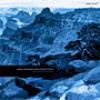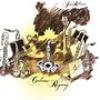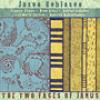October 28, 2010
It’s not likely that you’ll ever find music professor Jason Robinson just sitting around.
When he’s not teaching, he’s performing. Or conducting research for his scholarly work. Or writing. Or helping to find musicians for the Faultlines Jazz Festival he coordinates on campus. Or composing.
It’s that last area where he’s been most productive recently. The California native managed to find time to create three very dissimilar musical albums representing about a year’s worth of artistic energy. The three works—Cerulean Landscape, Cerberus Reigning and The Two Faces of Janus—were all released in the past month and are beginning to generate some real buzz in the music world. A reviewer with online publication All About Jazz, for example, called The Two Faces of Janus “one of the year’s most compelling modern jazz recordings.”
Public Affairs’ Caroline Hanna caught up with Robinson recently and asked him to riff on his work, improvisation and what a professional musician listens to in his spare time.
What’s different—and similar, for that matter—about each of the new albums?
[Laughing] Well, they have one similarity: they’re being released at about the same time. I have a lot of musical interests, so much so that it’s almost impossible to bring them together into one project. In a certain sense, these three releases reflect three different kinds of interests coming to the fore in different projects.
 | Listen to an excerpt from “Shimmer” Loading the player...
|
 | Listen to an excerpt from “Broken Seals” Loading the player...
|
 | Listen to “Return to Pacasmayo” Loading the player...
|
The oldest project is Cerulean Landscape, a duo with Anthony Davis, an acclaimed pianist and composer who is really well known for writing jazz operas. The album itself is a very acoustic album. I play soprano, alto and tenor saxophone and alto flute—no electronics—and Anthony plays acoustic piano. How would I describe it?… Anthony and I tend to resist the words “jazz” and “experimental,” partly because, in both those cases, we get a little nervous about what “jazz” and “experimental” might mean to different readers or listeners. Jazz, in particular, is always in the eye of the beholder. So I would use the term “creative music” to describe this album, although it is intimately in dialogue with the tradition of jazz and African American music.
The second release, Cerberus Reigning, is the second in a trilogy of conceptual solo releases of mine. The first was called Cerberus Rising, a fully acoustic album that I released last year. Cerberus Reigning is decidedly electronic. I do quite a bit of work in new music and new sound technologies, and one direction that I explore heavily is using computer-based, software-based platforms for modifying my tone, generating new sounds—a real-time electro-acoustic interaction with the computer. I play the alto saxophone, tenor saxophone and flute, send that through the computer and either modify or don’t modify the sound or sometimes even generate new sounds using the software. Also, the album is based on a real-time concept. It’s as if you were seeing me perform live in a concert. In other words: there’s no overdubbing, there’s no editing, there’s no mixing, none of that. It probably would’ve been easier to just record a concert, but instead I was recording in this real-time way in a studio.
The third album is The Two Faces of Janus. It’s certainly the most jazz-like of the three. It brings together all these different people to play music I’ve written, and the music deals with certain kinds of ideas about musical structure and contexts for improvisation. I wrote the pieces for The Two Faces of Janus in the [Duke] Ellingtonian fashion, which means I wrote them for specific players. I formed the group based on my interest in the specific sounds, approaches and stylistic aspects of each of the players. Once they were on board with the project, I went about writing the music. It was this interesting process in which—like in Ellington’s music—it needs these particular players for it to work right. I’ve been really intrigued by that idea of writing music for specific collaborators, and that’s been something that I’ve wanted to do for many years.
 |
How would you describe your musical interests?
I’m really fascinated with the intersection of composition and improvisation. I do a lot of improvising, and one of things that frequently happens after my concerts is that audience members will come up to me afterward and ask how much of that was composed and how much of it was improvised. At first, I was really intrigued by that question, because it is fundamental to a lot of the music I make. In fact, I often think of myself as creating context for improvisation. So I was at first intrigued that people would ask that and then became frustrated by it, because I think in the end, for me, music is music. Now I’ve come full circle and become super-intrigued by the fact that people do hear it as a combination of composition and improvisation. On a certain level I consider the music successful if people can’t tell which it is.
Improvisation is partly what your scholarly work focuses on, correct?
Absolutely. My dissertation, for example, focused on improvised music in California. I looked at modern-day communities that form in an ad hoc way around musical improvisation. I interviewed more than 50 improvisers and community-builders—people who put on concerts, ran record labels, managed e-mail listservs, performed. Then I positioned that enthnographic work next to a historical analysis of the way that improvised music emerged in California. The communities of improvisers at work today in the state are coming out of all sorts of different traditions—classical, world music, jazz, punk, rock and so on—and I was interested in the way that jazz and African American music was discussed in these modern communities. Right now I’m in the middle of a huge research project called “Re-Sounding the African Diaspora.” That involves looking at collaborations between continental African musicians today and African Diasporic musicians.
From where do you draw your inspiration?
On a certain deeply philosophical level, life for me as a human being is where it all comes from. That sounds mystical, and it is, I suppose. There are certain aspects of music that seem ineffable—that you can’t put into language—and that has an incredible appeal for me, still after so many years of being incredibly analytical. I still revel in the places where the music goes beyond language, where it’s just an experience. In addition to that, there are always certain kinds of historical influences that generate new ideas for me. As I look at certain trends in jazz of the past, I see an infinite wellspring of possible new directions. In terms of contemporary jazz practices, there are incredible things happening continually in communities of improvisers, composers and musicians. They’re coming up with amazing ideas, and I’m drawn to those ideas and learning about them. My music tends to be in dialogue with some of those new ideas.
Who are you listening to now?
Wow—good question. I’ve been listening to a lot of blues. And Jamaican music. Alpha Blondie, from the Ivory Coast. Yesterday I was listening to “Trenchtown Rock,” by Bob Marley and the Wailers. The other day I was listening to Bessie Smith and Ma Rainey and Robert Johnson. It changes from day to day.